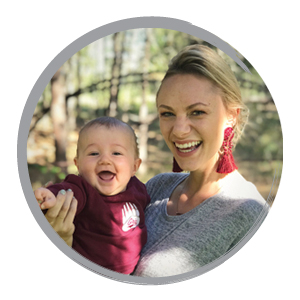The Weight of Womanhood

By Micah Larsen
You can’t see it, but I’m wearing a backpack. It’s heavy, but I never take it off.
Every woman I know wears one. Perhaps you’re wearing one, too. It’s filled with the weight of your womanhood. The things you’ve picked up and carried along the way.
Sexual harassment. Discrimination. The 80 cents you make to a man’s dollar. The squishy discomfort you felt the first time you wore a halter top and felt a man’s eyes move over your body. The iron grip of a silver-haired investment banker you dreaded serving on the golf course where you worked in high school. The unwanted body weight of a fraternity brother on a futon in a godforsaken house on the wrong side of the tracks in the middle-of-nowhere-Missouri.
Or maybe that’s just what’s in mine.
I realized I carried this invisible backpack around the time I started carrying a real one, the one I with all the stuff I needed to take my newborn son with me to meetings. It was my old life of a woman entrepreneur, plus two hours of prep time, 20 pounds of baby equipment, and a long list of anxieties. Everything was heavier, emotionally and mentally.
Through the eyes of a working mom, I started to see that the new burdens I was experiencing were unique to my gender. The expectation to choose between motherhood and work. The drool-covered labyrinth that is breastfeeding. The shame associated with baby weight, postpartum depression, stretch marks, and miscarriages. No one asked my male colleagues whether they were planning on giving up their careers. No one expected them to leave their hard-earned seat at any table, especially not to feed their children in a public bathroom. I saw for the first time that my lived experiences of womanhood were being stowed in my invisible backpack, and that the women I loved were carrying their own.
But every backpack has a silver lining. A woman’s invisible backpack has two.
First, the good thing about a heavy load is that it makes you stronger. Carrying all that weight around with you is, like, really good cardio. Uphill climb? No problem. You won’t even break a sweat.
Second, as with any well-stocked backpack, the more stuff you have, the more prepared you are. Crisis? Challenge? You’ve got this. You’ve been there before and, this time, you know what you’re doing. Issues that are generally experienced by women: eating disorders; sexual assault and harassment; gender discrimination; infertility; burdens associated with motherhood; etc., they may be a weight upon our shoulders, but, damn, they make us tough as nails.
We’re all walking around with all this stuff on our shoulders, but we don’t acknowledge it, often not even among friends and definitely not in mixed company. That’s what makes it so heavy, the alone-ness of it. So, I wish I had seen inside other women’s backpacks when mine was starting to get heavy. I wish I’d seen them unzip their packs and told me how they learned to carry them. That’s why I’m trying to be brave and -- even though it isn’t easy and it certainly isn’t glamorous -- I’m unpacking my invisible backpack and showing you what I carry. The doubting eyes of my male colleagues. The time I accidentally sprayed a Target employee with my breast milk. The day I sat in my unborn son’s nursery and cried thinking I was going to have to give up my career to be a good mom.
Here is the thing you must know, my friend: Just because I carry this load with me wherever I go does not mean it is easy. That even when I look light on my feet, I’ve got a backpack full of things I lived. That I am not ashamed of them, that I’m willing to have courage, to unpack my burdens, and to imagine with you what we could do if we didn’t have to carry them at all.
